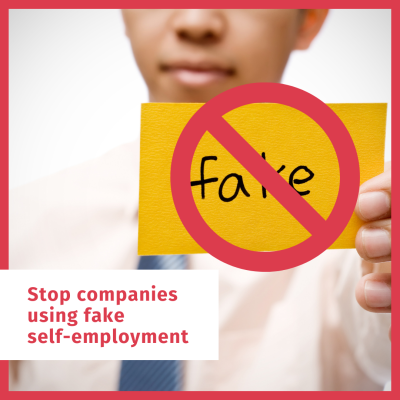Over the last decade, platform companies like Uber and Deliveroo have exploited loopholes in the law to make big profits through falsely self-employing their workers, allowing them to avoid obligations to proper pay and working conditions.
This means workers often don’t earn the minimum wage, don’t have any paid holidays, don’t have the right to paid sick leave or any social security contributions. It’s not only unfair to workers, but to the vast majority of businesses who play by the rules and to all citizens because these practices rob public services of funding.
Trade unions are successfully challenging platform companies in the courts across Europe, winning important judgements that prove the business model of these companies is not only unethical but illegal. The European Commission has also launched a consultation on “improving the working conditions in platform work.”
Time is running out on this business model built on exploitation. But Uber haven’t given up. They have doubled the amount they are spending on lobbying the EU and are now pushing hard for the creation of a “third status” between worker and self-employed.
To put it simply, they are trying to re-write the law to better suit their shareholders. But platform companies are companies like any other and should have to play by the same rules.
Our message to the EU is simple: don’t give Uber a free ride
1. End fake self-employment
People working for platforms are wrongly treated as self-employed so that companies can avoid obligations like minimum wages, holiday pay and social security. Workers should be considered workers, unless the company can prove workers are genuinely self-employed.
2. Make platforms give proof, not workers
Currently, workers must prove in court that they are employed by platform companies to benefit from their rights as workers. This should be reversed to ensure it is platform companies that have to prove workers are self-employed before being able to take rights away.
3. Platforms companies are still companies
A platform company is still a regular business, not a digital ‘intermediary’, so it’s only fair they follow the same rules and collective agreements as all other companies in their sector.
4. Don’t let Uber re-write the law
After courts found their drivers should be treated as workers not self-employed, Uber are now lobbying the EU to create a ‘third status’. Companies with illegal practices should be made to follow the law, not be allowed to re-write it.
5. All non-standard workers deserve rights
Cleaners, journalists or musicians are often in the same position as people working for platform companies. The EU must ensure that all non-standard workers have the same rights.
6. Workers should have the same rights wherever they are
When people worked at home during the pandemic, they didn’t lose any rights. So there should be no distinction between workers for ‘on-location’ platforms like Amazon and ‘online’ platforms like Uber. Workers should have the same rights wherever they are at home, in warehouse, in a car or on a bike.
7. A Europe-wide solution to a Europe-wide problem
Most platforms are multinational companies, which is why we need European action. Not only is that fairer for all workers, but it will stop companies trying to create a race to the bottom in Europe.

